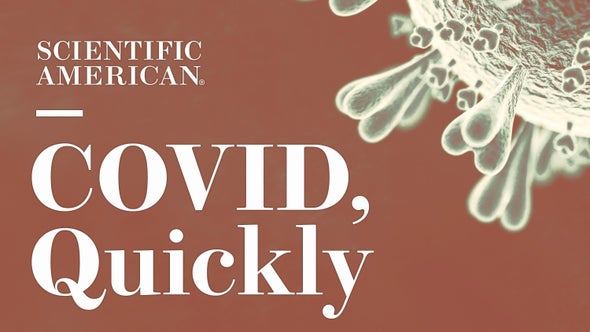In this new episode of our coronavirus podcast, we discuss a study that looked at the effects of Paxlovid on long COVID symptoms, and we also talk new bivalent boosters and immunity.

Antivirals Could Reduce Long COVID Risk and How Well the New Boosters Work: COVID, Quickly Podcast, Episode 43

Tanya Lewis: Hi, and welcome to COVID Quickly, a Scientific American podcast series! This is your fast-track update on the COVID pandemic. We bring you up to speed on the science behind the most urgent questions about the virus and the disease. We demystify the research, and help you understand what it really means.
I’m Tanya Lewis, one of Scientific American’s senior health editors. Josh is taking the week off. Today, I’m going to talk about how the antiviral Paxlovid may protect against long COVID, and what we know about the effectiveness of the new booster shots.
—
Lewis: We’ve talked a lot about long COVID on this show—lingering symptoms such as fatigue, brain fog, headache, difficulty breathing, etc. But so far, there haven’t been many effective ways of preventing it. Vaccination provides some protection, but the only way to totally reduce the risk is avoiding COVID altogether.
But there’s some promising news: a recent preprint study of COVID patients with at least one risk factor for severe disease found that those who took the antiviral Paxlovid had a 26 percent lower chance of developing long COVID symptoms three months later, compared with the control group.
There were 9,000 patients in the Paxlovid group and about 47,000 in the control group. Those in the Paxlovid group had a lower risk of 10 out of 12 long COVID symptoms. These include an abnormal heart rhythm, ischemic heart disease, pulmonary embolism, deep vein thrombosis, fatigue, liver disease, muscle pain, diabetes, and cognitive impairment.
And the protective effect was seen in people who were vaccinated, boosted, or unvaccinated.
But Paxlovid had another positive effect: it reduced the risk of death or hospitalization even beyond the acute phase of COVID. Patients were 48 percent less likely to die and 30 percent less likely to be hospitalized.
We know from previous studies, including one by the researcher who led this study, Ziyad Al-Aly at the Veterans Affairs St. Louis Healthcare System, that people who’ve had COVID are at an increased risk of heart problems for up to a year after getting COVID—even after a mild case. Paxlovid could reduce that risk.
Of course, the new study results still need to be replicated in other studies and populations. But if Paxlovid is one more tool in our toolbox for fighting long COVID, that’s a good thing.
—
Lewis: There’s some more good news on the vaccine front.
We’ve been waiting for data on how well the new bivalent booster shots work against Omicron.
A number of studies have shown the shots work better than the original vaccine against the newer variants of SARS-CoV-2 that are currently circulating.
Both Pfizer and Moderna recently announced that their vaccines produced substantial levels of neutralizing antibodies against the BA.4 and BA.5 Omicron subvariants.
Moderna says its vaccine provided some protection against a rapidly gaining variant called BQ.1.1, but the numbers were too small to draw strong conclusions.
We still haven’t seen the actual data, just press releases.
And showing the vaccines generated strong antibodies is not the same as showing that they protected against actual infection or severe disease.
But it is a sign that the vaccines are supercharging our immune systems to respond to the virus.
The Pfizer and Moderna results are in line with a number of preprint studies. Suthar et al. at Emory University found the bivalent boosters led to a four-fold increase in neutralizing antibodies against BA.5 vs. the original vaccine, and a 10-fold increase against BQ.1.1. Shi et al. found a three-fold increase against BA.5 but not much of a difference against BQ.1.1.
A handful of other studies found no difference between the new bivalent booster and the original vaccine. But we know the original vaccine still provides good protection against severe disease and death.
All of this suggests that getting the new booster shots is a good idea. Sadly, only a small fraction of Americans have gotten the updated shots. We know that the people dying of COVID now tend to be older folks, especially those who are not up to date on their vaccines.
There’s still time to get your booster—or remind Grandpa to get his—ahead of the holidays, but don’t delay.
—
Lewis: Now you’re up to speed. Thanks for joining us. Our show is produced by Jeff Delviscio and Tulika Bose. Come back in two weeks for the next episode of COVID, Quickly! And check out sciam.com for updated and in-depth COVID news.
[The above text is a transcript of this podcast.]

